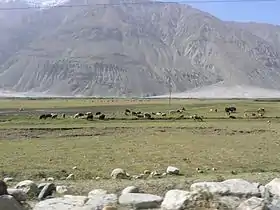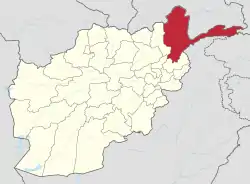Wakhan River
Wakhan River (Persian: اب واخان), Abe Vâxân (Pashto: دریائے واخان) Вахондарё, Vaxondaryo), also known in English as Ab-i-Wakhan, is the name of the Sarhadd branch of the Panj River along its upper length in Wakhan, Afghanistan.
| Wakhan River Ab-i-Wakhan | |
|---|---|
 | |
| Native name | دریائے واخان دریائے واخان (Pashto) |
| Location | |
| Country | Afghanistan |
_Corridor.jpg.webp)
The river arises in the Hindu Kush. It is formed by the confluence of the Wakhjir River and the Bozai Darya near Kashch Goz and Bozai Gumbaz, some 40 km west of the Wakhjir Pass.[1] Shortly thereafter, the Little Pamir comes to an end, and the conjoined river contracts into a narrow, deep, rapid river, delimited by cliffs and steep hills.[1] From here the banks have grown birch and juniper trees. 40 km west at Sarhad-e Broghil the river flows in a dramatic basin 3 km wide.[2] Little if any vegetation but dwarf willow grows in this region.[3]
At Sarhadd the river contracts into a narrower valley, which is more populated. The river emerges near the villages of Langar and Qila-e Panj, where it is joined by the Pamir River. From that point the river is always locally spoken of as the Panj River.[3]
References
- Mock and O'Neill (2004): Expedition Report
- Aga Khan Development Network (2010): Wakhan and the Afghan Pamir p.3 and map at p.5
- Adamec, Ludwig W., ed. (1972). Historical and Political Gazetteer of Afghanistan. 1. Graz, Austria: Akadamische Druck-u. Verlangsanstalt. p. 15.
